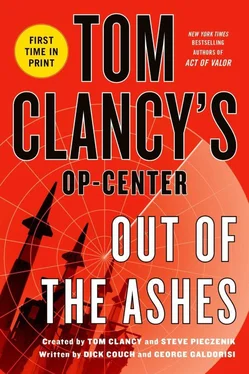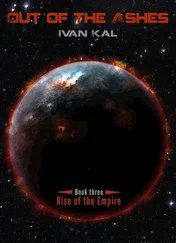“Whew,” Rodgers exhaled. “What did you tell him?”
“I told him what you’d tell him. If the president wants to talk with me I’m happy to do my duty.”
“We did our duty, Paul, but they shut us down.”
“They did, Mike. Now these are different times and different dangers. I need to at least talk with him, but I wanted to get your counsel first.”
Both men knew it wasn’t in anyone’s interest to slam the prior administration that had disestablished Op-Center. For the two of them, as well as for their loyal staff, it was a cataclysmic event when Op-Center was stood down. For Hood, it was a professional body blow, and one he didn’t see coming.
Both Hood and Rogers had bitter feelings toward the director of national intelligence and the secretary of defense who conspired to have the previous president close down Op-Center. And they also recognized more than a decade without any attacks on the American homeland, along with the nation’s economic crisis, made Op-Center a budgetary target. However, that was in the past.
It took a while for Rodgers to frame his thoughts. He knew even talking about reestablishing Op-Center wasn’t a trivial thing, and he understood Paul Hood well enough to read his former boss’s body language — he was conflicted.
“Sure, boss. I’d talk with the president, but I’d lay out all the facts as to why and how they shut us down last time and then I’d get ironclad assurance that he and his successors will never let that happen again. I’d make them court you big time.”
“That’s good advice, Mike, and goes with my line of thinking.”
“How soon are you going in?”
“Next day or two, I think.”
The two men continued to talk and as they did, Mike Rodgers helped Paul Hood weigh the issues that would be involved in recreating Op-Center. What Hood didn’t tell him, wouldn’t tell him, was that if there was going to be a new Op-Center, he couldn’t lead it.
* * *
Later that day, Trevor Harward sat at his desk in the West Wing. He had slept barely four hours in two days. His shirt was rumpled and his finely tailored suit trousers looked like sweat pants. It was a few minutes before noon and he had been in meetings for most of the last seven hours — and all for nothing. He had met with his core National Security Staff and ranking officials from State, CIA, FBI, and the National Counterterrorism Center— the best of the best. All of them had theories; none of them had a shred of proof of who had done this or why. We know nothing more now, Harward had to admit, than we did just after the attack. They were beginning to piece together the how, but not the why or the who. The national security advisor was frustrated beyond all measure.
The meetings had all been videotaped and in some cases monitored by selected military and civilian officials who could not be present. This encrypted video feed had also found its way to a study in a small but tasteful brownstone in Georgetown. It was the study of Gamal Haaziq. Haaziq was cleared for this information; in fact, his security clearances were about as high as was possible for an Egyptian-born U.S. citizen who was a tenured PhD in Middle Eastern Studies at American University and a practicing Muslim. Beyond all that, he was the most informed individual Harward knew in or out of government — and the smartest. Harward’s reverie was broken by the buzz of his intercom.
It was one of his senior aides. “Sir, Dr. Haaziq is on the line for your twelve o’clock VTC.”
“Thank you,” he replied into the desk speaker. “Tell him I’ll be just a minute.”
Harward glanced at his watch and saw the digital readout was exactly 1200. On his other wrist, his heart monitor said 130. It was the stress. He cinched up his tie, smoothed his hair, and clicked on the desk screen that opened the secure video-teleconference channel to connect him with Haaziq.
“Gamal, good morning, or rather good afternoon. Thanks for meeting with me.”
“Good afternoon, Trevor,” Haaziq replied with only a trace of an accent. In contrast to the disheveled Harward, the Egyptian was the picture of an urbane Arab, with strong dark features, full lips, and thick, well-cut silver hair. “Forgive me an observation, my friend, but you look terrible. Even in these times, you must attend to yourself.”
Despite his state, Harward was touched by his concern. “Thank you, Gamal. Perhaps the best medicine for me is for you to tell me something useful — something I can pass along to the president. I assume you VTCed into this morning’s meetings?”
“I did. Your excellent staff, and the others, they are all good people, but as you know, they have not a clue about who did this or why they did it.”
Harward nodded wearily. “Nor do I. That’s why I hope you can help us, for we seem to be at an impasse.”
Gamal Haaziq had extensive contacts throughout the Middle East. He had been an outspoken critic of the policies of the United States and of the moderates in the Muslim world who refused to condemn acts of terror or to denounce the extremists who committed them. Both, he maintained, were responsible for the cycle of distrust and violence. Yet he was an American citizen and a patriot. Harward had come to like and trust the man. If there was a group or entity responsible for the stadium bombings, Haaziq’s contacts might have that information.
“I’m sorry not to be able to help you with this, Trevor, but I can tell you nothing. I wish I could. I’ve spoken with those who would know if there were an organization or splinter group responsible. They have said nothing and I believe they know nothing.”
Harward sighed and visibly slumped in his chair. “So can you tell me anything?”
“Only that this is nothing like 9/11. This is very different, and in my opinion, has nothing to do with al Qaeda or one of the al Qaeda Central franchisees. Given the sophistication of this attack and the lack of information out there, I think you are dealing with a very small group or even with only one or two individuals. I also think whoever did this is extremely well resourced. I recommend that you follow the money behind the act and that you look at revenge as motive for this.”
Revenge, mused Harward. He thanked Haaziq and broke the connection.
The Syrian Desert
(November 12, 1630 Arabian Standard Time)
Half a world away, while the forces unleashed by the Arab Spring had significant impact, and that effect was still playing out, one thing that hadn’t changed was the developed and developing world’s thirst for oil. Deep in the vast Syrian Desert, massive vehicles of all kinds kicked up a tsunami of sand and dust as they maneuvered over the flat and rocky desert surface and an army of workers of multiple nationalities labored under the supervision of a small team of Saudi engineers.
It was barely organized chaos as the polyglot of foreign nationals driving the trucks, cranes, bulldozers, and other huge vehicles had no common language so they maneuvered around each other as best they could by liberally using their horns and flashing their headlamps. The pace wasn’t just intense; it was frenetic and even manic.
The Saudi foreman managing the work crew putting the enormous pipes on their mountings urged his work crew on. “You can do it! The prince was here two days ago and promised us a bonus if we got just two kilometers ahead of schedule. We can get that far ahead by tomorrow morning if we just keep at it for another four or five hours.”
The weary men bent to their task. They had been working hellish hours in the desert sun for months with little respite. Yet the money was good and the Indians, Pakistanis, Filipinos, and Indonesians who formed the bulk of the labor crew needed the money, so they said little, continued to work, and sent the majority of their earnings home. They didn’t understand why the Saudis were building this pipeline, or why there was so much urgency to construct it so quickly, nor did they care. However, those in Saudi Arabia’s elite understood why.
Читать дальше












